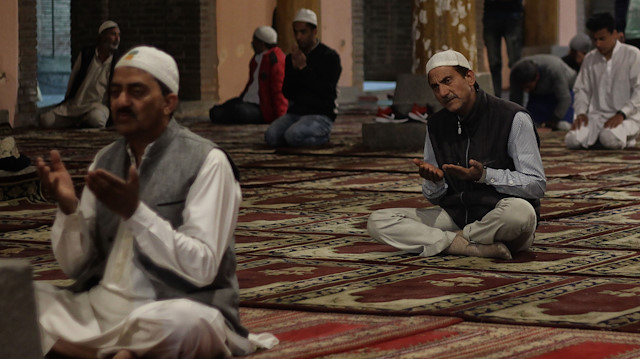
Muslim groups say Indian Supreme Court did not serve justice by handing over Babri Mosque site to Hindus
Even as India's Supreme Court on Saturday handed over the site of Babri Mosque to Hindus for the construction of a temple, Muslim parties said they respect the verdict but are dissatisfied with it.
The Muslim side, represented by the All India Muslim Personal Law Board (AIMPLB) -- a body of top Islamic clerics -- said the judgement has not served justice.
In a statement, the board expressed surprise that the court while accepting all the evidence put forth by the Muslim party, overturned its own argument at the end, by handing over the land of Babri Mosque to Hindus, exercising extraordinary discretionary powers. The Muslim body described attitude of the court as “painful".
“Neither equity nor justice has been served,” said senior lawyer Zafaryab Jilani, who represented the Muslim body in the court.
Hindus and Muslims have for decades been bitterly divided over the 16th century Babri Mosque site.
The apex court in its judgment also directed the government to allot a “suitable plot” of land measuring five acres to Muslims to construct a mosque at some other place in the city of Ayodhya.
“As per the Sharia law, we cannot give away a mosque. However, we will abide by the court’s verdict. The Hindus claim that the temple was present since the Vikramaditya era, but there is no evidence of that,” said Jilani.
Prominent Indian Muslim leader Asaduddin Owaisi also expressed dissatisfaction with the court verdict. He said the court was “indeed supreme but not infallible”.
"I am not satisfied with the verdict… We were fighting for our legal rights. We do not need five-acre land as a donation. In my opinion, we should reject this land offer. Do not patronize us," Owaisi told a news conference.
-Court echoed Advani’s offer
The spokesman of Babri Mosque Action Committee, Syed Qasim Rasool Ilyas said Muslim community cannot welcome the judgement.
Ilyas, also a member of AIMPLB, told news website rediff.com: “If you dig any old structure you will surely find some ancient relic under that structure. So, this is not proof of a mandir [temple] under the Babri Masjid. And let me make it clear, the Supreme Court did not say the Babri Masjid was built by destroying a Ram mandir. In cases of title suit these things are not considered as evidence.”
He alleged that the Supreme Court was speaking the words of Lal Krishna Advani, a veteran Hindu nationalist politician, who led the movement for the the temple that led to the demolition of Babri Mosque in 1992.
Advani had advised Muslims to take some other land to build an alternate mosque in Ayodhya. “The Supreme Court has echoed his words,” he added.
Built in 1528 under the rule of first Mughal emperor Babur, the grand mosque along with a land of 2.77 acres in India's northern province of Uttar Pradesh was demolished by a mob of radical Hindus in 1992. Hindus claimed one of their gods, Lord Ram, was born at the site of the mosque.
Jama’at-e-Islami Hind (India) also expressed dissatisfaction with the judgement, however, it also appealed to people of the country to “honor the judgment, respect the law, and maintain communal harmony”.
“There should not be any polarization on communal lines due to the verdict. This judgment is neither a victory nor defeat of any party," said Syed Sadatullah Hussaini, president of Jama'at-e-Islami Hind.
Iqbal Ansari, who is son of Hashim Ansari, the original litigant in Babri Mosque case which was filed in 1949, said he was “happy” at the verdict.
“We respect the court decision; I am happy that an important dispute has been settled. But I expect that no other mosque will be touched in future,” said Ansari.
Hashim lived in the vicinity of the Babri Mosque in Ayodhya. He had filed a complaint before police that some people in the dead of night had scaled the wall of the mosque and kept idols of Lord Ram, at the sanctum sanctorum of the mosque.
Hello, the comments you share on our site are a valuable resource for other users. Please respect other users and different opinions. Do not use rude, offensive, derogatory, or discriminatory language.
The floor is all yours.








